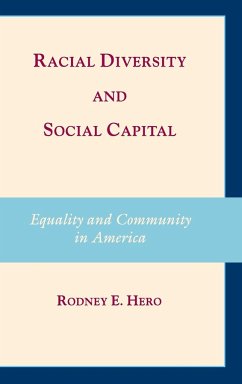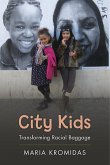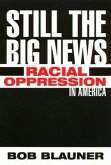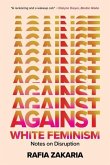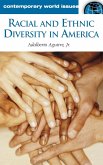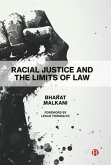This book connects and critically assesses two bodies of research - social capital and racial diversity.
Race and racial diversity are important aspects of America and have been shown to substantially affect social relations and the political system, often in ways inconsistent with the values of equality. However, greater civic association and a general sense of community, embodied in the concept of social capital, are said to have tremendous beneficial effects and profoundly influence American society. This study juxtaposes and critically assesses two bodies of research that have reached different conclusions on these issues. Is America's legacy of racial inequality an 'evil twin' of the benefits of social capital? By analysing the social outcomes for racial minorities, in addition to other dimensions of American politics, the author shows that the impact of racial diversity consistently outweighs that of social capital.
Review quote:
"Focusing on fundamental questions that concern participation, public policy, and vectors of inequality, this thoughtful book enlarges our understanding of how race deeply constitutes many features of American politics and society. In so doing, it powerfully demonstrates the costs to empirical and normative theory when such matters are downplayed or underestimated, and the gains to understanding and possibility when they are brought from the periphery to the center of political analysis."
Ira Katznelson, Ruggles Professor of Political Science and History, Columbia University, author of When Affirmative Action Was White: An Untold History of Racial Inequality in Twentieth-Century America (2005).
"Rodney Hero has done it again! With characteristic polish and aplomb, Hero moves the debate over racial diversity and social capital from Sturm und Drang to carefully considered, empirically testable propositions. Social capital, it turns out, is neither a Trojan horse nor a panacea for the deep divisions that characterize pluralistic societies. In many contexts, it works more toward the maintenance of white privilege than it does as a collective good, aiming toward the betterment of a community dans l'ensemble. This is a splendid, signal contribution."
Taeku Lee, Department of Political Science, University of California, Berkeley
Table of contents:
1. Introduction; 2. The social capital thesis; 3. The racial diversity thesis; 4. Examining social outcomes, and civic and economic equality; 5. Voter turnout and other forms of participation in context; 6. Public policy outputs; 7. Conclusions.
Hinweis: Dieser Artikel kann nur an eine deutsche Lieferadresse ausgeliefert werden.
Race and racial diversity are important aspects of America and have been shown to substantially affect social relations and the political system, often in ways inconsistent with the values of equality. However, greater civic association and a general sense of community, embodied in the concept of social capital, are said to have tremendous beneficial effects and profoundly influence American society. This study juxtaposes and critically assesses two bodies of research that have reached different conclusions on these issues. Is America's legacy of racial inequality an 'evil twin' of the benefits of social capital? By analysing the social outcomes for racial minorities, in addition to other dimensions of American politics, the author shows that the impact of racial diversity consistently outweighs that of social capital.
Review quote:
"Focusing on fundamental questions that concern participation, public policy, and vectors of inequality, this thoughtful book enlarges our understanding of how race deeply constitutes many features of American politics and society. In so doing, it powerfully demonstrates the costs to empirical and normative theory when such matters are downplayed or underestimated, and the gains to understanding and possibility when they are brought from the periphery to the center of political analysis."
Ira Katznelson, Ruggles Professor of Political Science and History, Columbia University, author of When Affirmative Action Was White: An Untold History of Racial Inequality in Twentieth-Century America (2005).
"Rodney Hero has done it again! With characteristic polish and aplomb, Hero moves the debate over racial diversity and social capital from Sturm und Drang to carefully considered, empirically testable propositions. Social capital, it turns out, is neither a Trojan horse nor a panacea for the deep divisions that characterize pluralistic societies. In many contexts, it works more toward the maintenance of white privilege than it does as a collective good, aiming toward the betterment of a community dans l'ensemble. This is a splendid, signal contribution."
Taeku Lee, Department of Political Science, University of California, Berkeley
Table of contents:
1. Introduction; 2. The social capital thesis; 3. The racial diversity thesis; 4. Examining social outcomes, and civic and economic equality; 5. Voter turnout and other forms of participation in context; 6. Public policy outputs; 7. Conclusions.
Hinweis: Dieser Artikel kann nur an eine deutsche Lieferadresse ausgeliefert werden.
"Rodney Hero has done it again! With characteristic polish and aplomb, Hero moves the debate over racial diversity and social capital from Sturm und Drang to carefully considered, empirically testable propositions. Social capital, it turns out, is neither a Trojan horse nor a panacea for the deep divisions that characterize pluralistic societies. In many contexts, it works more toward the maintenance of white privilege than it does as a collective good, aiming toward the betterment of a community dans l'ensemble. This is a splendid, signal contribution." Taeku Lee, Department of Political Science, University of California, Berkeley

